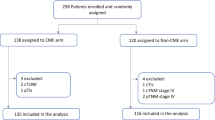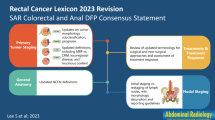Abstract
Background
Lymph node involvement is an important prognostic factor in colorectal cancer. Sentinel lymph node (SLN) evaluation for assessing lymph node status in colorectal cancer remains controversial. Here we evaluated the sensitivity, predictive value, and accuracy of SLN evaluation for determining lymph node status in resectable colon cancer.
Methods
A prospective phase 2 cohort study of SLN evaluation in colon cancer was conducted from September 1998 to April 2006. Patients underwent resection and SLN mapping with 1% isosulfan blue and m99Tc sulfur colloid injection. SLNs were evaluated by hematoxylin and eosin (HE) staining and, if findings were negative, by additional thin HE sections and immunohistochemical (IHC) staining for pancytokeratin and MOC31. Overall survival for patients with IHC-positive disease was evaluated by Kaplan-Meier analysis and the log rank test.
Results
SLNs were identified in 119 (99%) of the 120 patients eligible for the study. Median number of SLNs identified was 4 (range, 0–13). Forty-nine patients (40%) had nodal metastases on HE. The SLN accurately identified nodal metastases in 29 (59%) of these 49 patients and was negative for metastases in 22 patients (41%). SLNs in eight patients (7%) were negative by HE but positive by IHC staining. Positive IHC status did not affect survival after a median follow-up of 33 months (P = .41).
Conclusions
The low sensitivity and high false-negative rate of SLN evaluation does not support this technique for improving the accuracy of nodal staging for patients with colon cancer. The significance of IHC-positive SLNs remains uncertain.
Similar content being viewed by others
References
Jemal A, Siegel R, Ward E, et al. Cancer statistics, 2007. CA Cancer J Clin 2007;57:106–30
O’Connell JB, Maggard MA, Ko CY. Colon cancer survival rates with the new American Joint Committee on Cancer sixth edition staging. J Natl Cancer Inst 2004;96:1420–5
Andre T, Boni C, Mounedji-Boudiaf L, et al. Oxaliplatin, fluorouracil, and leucovorin as adjuvant treatment for colon cancer. N Engl J Med 2004;350:2343–51
Gill S, Loprinzi CL, Sargent DJ, et al. Pooled analysis of fluorouracil-based adjuvant therapy for stage II and III colon cancer: who benefits and by how much? J Clin Oncol 2004;22:1797–806
Sargent DJ, Wieand HS, Haller DG, et al. Disease-free survival versus overall survival as a primary end point for adjuvant colon cancer studies: individual patient data from 20,898 patients on 18 randomized trials. J Clin Oncol 2005;23:8664–70
Giuliano AE, Kirgan DM, Guenther JM, Morton DL. Lymphatic mapping and sentinel lymphadenectomy for breast cancer. Ann Surg 1994;220:391–8
Krag D, Weaver D, Ashikaga T, et al. The sentinel node in breast cancer—a multicenter validation study. N Engl J Med 1998;339:941–6
Veronesi U, Paganelli G, Viale G, et al. Sentinel lymph node biopsy and axillary dissection in breast cancer: results in a large series. J Natl Cancer Inst 1999;91:368–73
Cascinelli N, Bombardieri E, Bufalino R, et al. Sentinel and nonsentinel node status in stage IB and II melanoma patients: two-step prognostic indicators of survival. J Clin Oncol 2006;24:4464–71
Morton DL, Thompson JF, Cochran AJ, et al. Sentinel-node biopsy or nodal observation in melanoma. N Engl J Med 2006;355:1307–17
Morton DL, Wen DR, Wong JH, et al. Technical details of intraoperative lymphatic mapping for early stage melanoma. Arch Surg 1992;127:392–9
Ranieri JM, Wagner JD, Wenck S, et al. The prognostic importance of sentinel lymph node biopsy in thin melanoma. Ann Surg Oncol 2006;13:927–32
Chang GJ, Rodriguez-Bigas MA, Skibber JM, Moyer VA. Lymph node evaluation and survival after curative resection of colon cancer: systematic review. J Natl Cancer Inst 2007;99:414–5
Jestin P, Pahlman L, Glimelius B, Gunnarsson U. Cancer staging and survival in colon cancer is dependent on the quality of the pathologists’ specimen examination. Eur J Cancer 2005;41:2071–8
Suzuki O, Sekishita Y, Shiono T, et al. Number of lymph node metastases is better predictor of prognosis than level of lymph node metastasis in patients with node-positive colon cancer. J Am Coll Surg 2006;202:732–6
Swanson RS, Compton CC, Stewart AK, Bland KI. The prognosis of T3N0 colon cancer is dependent on the number of lymph nodes examined. Ann Surg Oncol 2003;10:65–71
Feig BW, Curley S, Lucci A, et al. A caution regarding lymphatic mapping in patients with colon cancer. Am J Surg 2001;182:707–12
Patten LC, Berger DH, Rodriguez-Bigas M, et al. A prospective evaluation of radiocolloid and immunohistochemical staining in colon carcinoma lymphatic mapping. Cancer 2004;100:2104–9
Bertagnolli M, Miedema B, Redston M, et al. Sentinel node staging of resectable colon cancer: results of a multicenter study. Ann Surg 2004;240:624–8
Bilchik AJ, DiNome M, Saha S, et al. Prospective multicenter trial of staging adequacy in colon cancer: preliminary results. Arch Surg 2006;141:527–33
Saha S, Seghal R, Patel M, et al. A multicenter trial of sentinel lymph node mapping in colorectal cancer: prognostic implications for nodal staging and recurrence. Am J Surg 2006;191:305–10
Des Guetz GN, Wind P, Breau P, et al. Is sentinel lymph node mapping in colorectal cancer a future prognostic factor? Meta-analysis of the literature. In: Grunberg SM, ed. Gastrointestinal Cancer Symposium. Orlando, FL: American Society of Clinical Oncology, 2007:288
Redston M, Compton CC, Miedema BW, et al. Analysis of micrometastatic disease in sentinel lymph nodes from resectable colon cancer: results of Cancer and Leukemia Group B Trial 80001. J Clin Oncol 2006;24:878–83
Broll R, Schauer V, Schimmelpenning H, et al. Prognostic relevance of occult tumor cells in lymph nodes of colorectal carcinomas: an immunohistochemical study. Dis Colon Rectum 1997;40:1465–71
Greenson JK, Isenhart CE, Rice R, et al. Identification of occult micrometastases in pericolic lymph nodes of Duke’s B colorectal cancer patients using monoclonal antibodies against cytokeratin and CC49. Correlation with long-term survival. Cancer 1994;73:563–9
Iddings D, Ahmad A, Elashoff D, Bilchik A. The prognostic effect of micrometastases in previously staged lymph node negative (N0) colorectal carcinoma: a meta-analysis. Ann Surg Oncol 2006;13:1386–92
Acknowledgments
We thank Christine F. Wogan of the M. D. Anderson Department of Scientific Publications for editing the article. This project was supported in part by an unrestricted grant by Ethicon Endosurgery.
Author information
Authors and Affiliations
Corresponding author
Rights and permissions
About this article
Cite this article
Lim, S.J., Feig, B.W., Wang, H. et al. Sentinel Lymph Node Evaluation Does Not Improve Staging Accuracy in Colon Cancer. Ann Surg Oncol 15, 46–51 (2008). https://doi.org/10.1245/s10434-007-9629-8
Received:
Revised:
Accepted:
Published:
Issue Date:
DOI: https://doi.org/10.1245/s10434-007-9629-8




